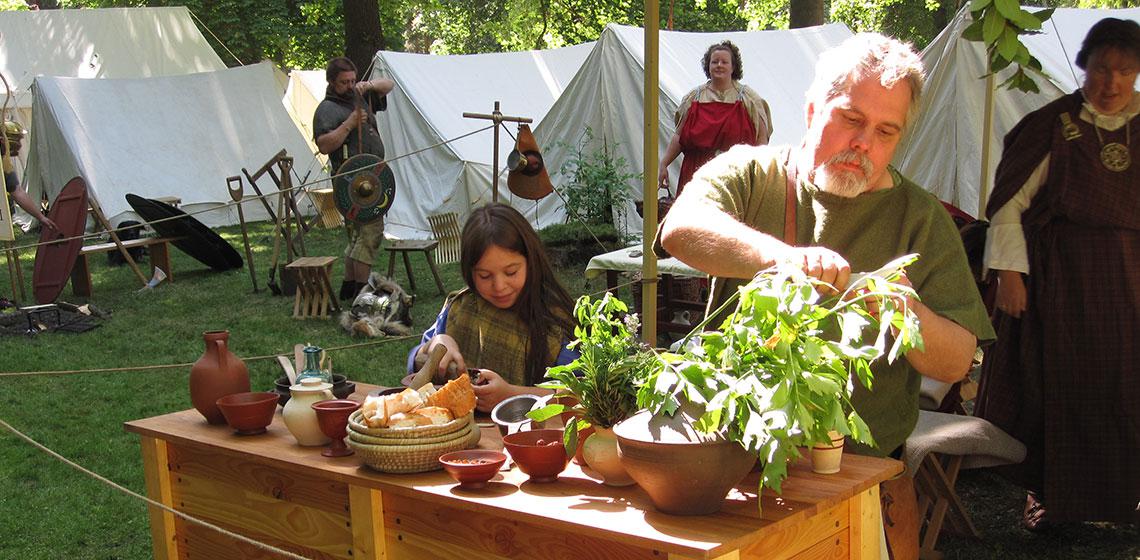
It is hard to describe the strengths of Cohors I. Germanorum (pronounced Cohors Prima Germanorum) without lapsing into phrases. Of course we also want to:"Bring history to life", "Get artefacts out of the cabinet and bring them to life", "Bring Living history into the present". But that is what all other groups of performers want!
What's different in the Coh.I.Germ.?
We try to avoid a "role-playing situation," largely because this can quickly slip into farmer’s theater where the visitor sees more a show instead of information. We rather intend to arouse interest from the public with our equipment which is as authentic as possible, when we represent historical life and explain without lapsing into dry recitation.
We pick up the visitors at their current level of knowledge by means of a display which people can experience and understand as well as with demonstrations and stimulate discussions and or engage them in hands-on activities. Thus Coh. I. Germanorum responds to every person, whether they are interested professionals or ‘history novice’.
How do we get into this intense contact between visitor and actor?
The individual stations of our camp are filled with members who deal intensively with one, often several areas of expertise. We offer the public a comprehensive picture of the current state of knowledge where we include the nearest relevant Roman sites.
When we for example prepare a dish present in our show kitchen while we refer to the literary and archaeological sources, we explain about the ingredients needed, offer explanation about the equipment and tools and can, where necessary, offer those interested at the end of the preparation a taste.
In the military area, our Auxilliarii explain the weapons and armor which the audience can try out or taken in their hands. Then they are brought to the Lanista (fight trainer). Following on this he explains interactively about the use of the weapons using volunteers from among the spectators - all safe and using historical sources.
Our didactic principle
Basically, we always refer to the fact that we only present our interpretations of the source material and want all presentations we show to be understood as reconstruction proposals. We do not claim the ultimate truth. Since the historical research is constantly evolving, when difficult questions arise, our actors are able to turn with issues to both internal and external experts, true to the motto: "Better to pass on a question then to consolidate a false view of history".
Our primary concern is the intensive work with visitors at events. In our research, our personal interest in historical knowledge and accuracy are on equal footing with the desire to convey the fascination of historical life images to an interested audience. We partly rely on decades of experience of our members in presentation and communication of history.
Our own history
The Cohors I. Germanorum was the first historical character group in Northern Germany, who chose a so-called Auxiliary Forces in Roman service as an example. The group was founded in 1993 by Dirk Horst Stein, which initially joined the Römercohorte Opladen at events. In 1995 we received reinforcements from the friends of the "Interessengemeinschaft Lebendiges Frühes Mittelalter" in Hannover. Since then, our group has grown from about 12 to 30 active members.
We have abundant experience with museum presentation and film productions. We have already worked for the WDR, NDR, Pro7 and the British Channel 4. Appearances at fairs and in schools are also included to our program.
Our military and civilian equipment
The military equipment of the Cohors reflects the composition of light infantry troops of the 1st Century AD, and their various ranks. For us it is interesting that at Auxiliary Forces both Roman and "barbarian" influences mingle. We investigate how the equipment of members of the auxiliary forces is composed and produce these with much detail as possible by ourselves. Of course we always consider the latest state of research.
The military sector is not all: the Vicus was what the Romans referred to as the civilian area of a military camp. It was an extension with the purpose of supplying the soldiers. It often assumed the character of a real village over time. Our members currently cover the art of glass, preparing food, doing games and making toys, and production of fabrics and textiles. Part of our equipment is a reconstructed onager, size 1:3 for our children program, based on archaeological artefacts.
Who can join?
Most members come from the Hannover area, but geographic proximity is not required to become a member. People of all ages who wish to pursue a historical craft of antiquity are welcome. We particularly are interested in strengthening our troops. Mobility and willingness to invest in historically correct equipment are must. If you are curious you are welcome to contact us.

